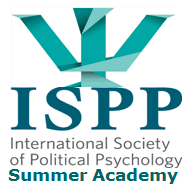

ISPP's 2021 Annual Meeting - Recognition and (Re)claiming spaces: Marginalization, Colonization, and Privilege
Sun, 11 Jul 2021 - Tue, 13 Jul 2021
Montreal, Canada
Organized by: The International Society of Political Psychology
Contact: montreal2021@ispp.org
As an international and interdisciplinary scholarly society, ISPP champions diversity in methods, theories, and research problems, welcomes perspectives and contributions from any location and from members with any identities, endorses human rights for all, and advocates for academic freedom for educators and students and freedom of thought for all people. Under the umbrella interdiscipline of political psychology, ISPP members research how humans’ many capacities, both collective and individual, influence the ways that people try to govern by both formal and informal means, the challenges and consequences people face in such endeavors, and how those endeavors change individuals and groups. You are warmly invited to participate in this exciting agenda at our annual scientific meeting in Montreal, 11-13 July, 2021.
In keeping with our tradition of researching diverse human problems, and human solutions, the theme of the 2021 Montreal scientific meeting is Recognition and (Re)Claiming Spaces: Marginalization, Colonization, and Privilege.
This topic is important for two main reasons. First, several social sciences, educators, and national governments were instrumental in attacking and subordinating indigenous communities and others which have been marginalized via colonization and nationalization. Awareness of these processes and awareness of the positive alternatives developed by people in communities that have experienced marginalization, can help stop perpetuating -- by design or by neglect -- the damaging processes of colonization and nationalization. Second, how such communities grapple with self-governance, self-determination, inter-governmental relations, the ecology and economy, cultural inheritance, health, gender roles, trans-generational continuity and change are at the heart of political psychology. Our society and discipline can only be made more complete and rich through more recognition of peoples who have experienced (and continue to experience) marginalization and exclusion.
To this end, the 2021 Program Committee seeks to bring visibility, recognition and attention to matters of importance and relevance to Indigenous and other peoples who may seek to claim recognition and space within political psychology. The conference will create opportunities for these voices to be heard and better understood. Many view this as necessary for recognizing how some research programs overtly and covertly transmit Eurocentric values and orientations in encounters with indigenous and other marginalized peoples. The conference can further a robust and respectful investigation into how peoples who have experienced (and continue to experience) marginalization and exclusion define their issues, concerns and methods, and how methods originating in Western science might be useful or unhelpful to these communities.
In addition to featuring Indigenous and marginalized perspectives on the program, we encourage paper and panel proposals that will promote dialogue between researchers. In addition, we invite panels featuring multiple disciplines and methods as ways of addressing political psychological topics. Political psychologists are researching topics such as intergovernmental relations, the cultures of politics, justice definitions and procedures, collective decision-making, the nature of leadership, distinctive and multiple identities, eliminating scientific bias, researcher-activist and community relationships, cultural sharing and cultural appropriation, gender in formal and informal politics, how health and social services pertain to group power and intergroup relations, deliberative democracy, multi-layered politics and governance, community self- help, and others. In addition to panels and round-table discussions, the conference features person-to-person contact time, to enable opportunities for exchange, collaboration, and professional networking.
The ISPP Annual Meeting brings together scholars across disciplines and epistemologies, using a wide range of theoretical and methodological approaches. The overarching goal of the Society is to engage with new research produced by scholars in fields across the social sciences and other disciplines, including psychology, political science,sociology, ethnic studies, anthropology, history, economics, history, media and communication studies, philosophy, and others. Proposals for traditional panel papers are welcome, as are proposals for symposia, roundtables, blitz presentations and posters on any topic in political psychology.
Further, because neither disciplines nor methods remain fixed, the Montreal conference will feature several workshops and symposia on new research methods, including qualitative, statistical, and big-data. Other conference features for attendees include a “Meet the Editors” panel (of our journal, Political Psychology), social occasions for early-career scholars, mentoring sessions, our Scholars Under Threat symposium, and the ISPP Institute, held before the conference.
Montreal is an accessible, multi-cultural, friendly city with an astounding variety of affordable cuisines, art museums, music venues, world-class universities, and Montreal neighbors some of the prettiest landscapes and waterways in North America. Our conference just follows the world-famous Montreal Jazz festival. Please plan to come share, learn, and participate in the 2021 Montreal conference!
While we hope to see you in Montreal, the conference is prepared to go virtual if conditions require. We will announce the format of the 2021 ISPP Annual Meeting as soon as more information is available to make as sound a decision as possible.
- Dr. Carla Houkamau, Associate Professor, Manupiri Māori, (Associate Dean Māori), Department of Management and International Business, Business School at the University of Auckland, Program Co-Chair
- Dr. Allison Harell, Professor, Department of Political Science, UQAM Research Chair in the Political Psychology of Social Solidarity; Co-Director, Consortium on Electoral Democracy, Université du Québec à Montréal, Program Co-Chair
- Dr. Felicia Pratto, Professor of Psychological Sciences, University of Connecticut, PresidentElect
*The International Society of Political Psychology (ISPP) is an interdisciplinary organization representing all fields of inquiry concerned with exploring the relationships between political and psychological processes. Members include psychologists, political scientists, psychiatrists, historians, sociologists, economists, anthropologists, as well as journalists, government officials and others. The Society is also international, with members from all regions of the world: the Americas, Europe, Asia, the Middle East, and Africa.











